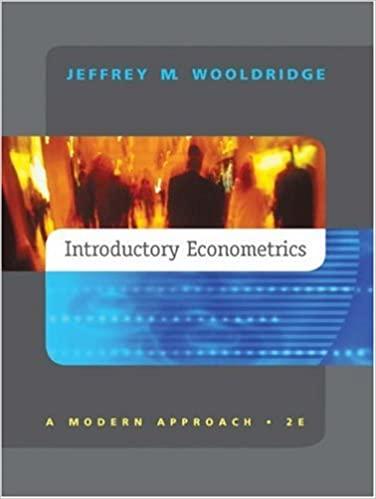Question
Fuel Taxes and optimality Fuelling discontent How much should petrol be taxed? The tax on petrol varies widely around the developed world. America's gasoline tax
Fuel Taxes and optimality
Fuelling discontent
How much should petrol be taxed?
The tax on petrol varies widely around the developed world. America's gasoline tax is currently about 40 cents an American gallon, equivalent to 7 pence a litre. Many Americans are calling for it to be cut, as the summer increase in prices begins to make itself felt, and reflecting a more general alarm about the country's energy crisis'. In Canada the tax is half as big again as in America; in Australia it is more than double.InJapanandmoreofEurope,thespecifictaxonpetrolisaroundfivetimeshigherthanin America, standing at the equivalent of some 35 pence a litre. At the upper extreme is Britain, where fuel duty (paid in additional to value-added tax) has raised in recent years to a punitive rate of just under 50 pence a lire, seven times the American levy.
Youwouldexpectwell-designedpetroltaxestovaryfromcountrytocountry,accordingtonational circumstances - but not, on the face of it, by a factor of seven. In America it is taken for granted that Europe'spetroltaxes,letaloneBritain's,areinsanelyhigh,andpresumablysomethingtodowith socialism. In Britain, on the other hand, it is taken for granted that America's gas tax is insanely low, part of a broader scheme to wreck the planet.Protests in Britain last year showered that petrol tax had finally been raised all the way up to its political ceiling - but nobody expects or even calls for the tax to be cut to the American level.
America and Britain may both be wrong about the gas tax, but it seems unlikely that they can both be right.So how heavily should petrol be taxed?ApaperbyIanParryofResourcesfortheFuture,an environmental think-tank in Washington, DC, looks at the arguments.
The most plausible justification is taxing petrol more highly than other goods is that using the stuff harms theenvironmentandaddstothecostoftrafficcongestion.This is indeed how Britain's government defends its policy. But the fact the burning petrol creates these 'negative externalities' does not imply, as many seem to think, that no tax on petrol could ever be too high. Economics is precise about the tax that should, in principle, be set to deal with negative externalities; the tax on a litre of fuel should be equal to the harm caused by using a litre of fuel. If the tax is more than that, its costs (which include the inconvenienceinflictedonpeoplewhowouldratherhaveusedtheircars)willexceeditsbenefits (including any reduction in congestion and pollution).
The pollution costs of using petrol are of two main kinds: damage to health from breathing in emissions such as carbon monoxide and assorted particulates, and broader damage to the environment through the contribution that burning petrol makes to global warming. Reviewing the literature, Mr. Parry notes that most recent studies estimate the health cost of burning petrol at around 10 pence a litre or less.
Theharmcausedbypetrol'scontribution toglobalwarmingis,forthetimebeing,muchmore speculative. Recent high-damage scenarios, however, put an upper limit on the cost at about $100 per ton of carbon, equivalent to 15 pence a litre.
Jammed
High petrol taxes also help to reduce traffic congestion.However, they are badly designed for that purpose.Curbingthenumberofcarjourneysisonlyonewaytoreducecongestion.Others include persuading people either to drive outside peak hours or to use routes that carry less traffic. High petrol taxes fail to exploit those additional channels. As a result, Mr. Parry finds, the net benefits of a road-specific peak-peak period fee (the gain of less congestion minutes the cost of disrupted travel) would be about three times bigger than a petrol-tax increase calculated to curb congestion by the same amount.
Still, if politics or technology rules out congestion-based road-pricing, a second-best case can be made for raising the petrol tax instead. According to Mr. Parry, congestion costs in Britain might then justify an additional 10 pence a litre in tax.
Thisbringsyoutoatotalpetroltaxofaround25pencealitre,sothisupper-boundestimateofthe optimal tax represents a tax rate of well over 100% - a 'high tax', to be sure. Yet Britain's current rate is roughly double this. On the same basis, of course, America's rate is far too low (even a lower bound for the optimal rate would be a lot higher than 7 pence a litre).
Britain's rate, judged according to the environmental and congestion arguments, looks way too high -but plainly the British government has another reason for taxing petrol so heavily. It needs the money o finance its plans for public spending.Politically,raisingmoneythroughthetaxonpetrol,protests notwithstanding, has proven far easier than it would have been to collect the cash through increases in income tax or in the broadly based value-added tax - or, for the matter through congestion based road-pricing (always dismissed as 'politically impossible').
Thisseemsodd.Supposingthatactualandprojectedpublic spendingjustifiedhighertaxation,Mr. Parry'sanalysisstronglysuggeststhatthecountrywouldhavebeenbetteroffpayingforitthrough income taxes than through a punitive petrol tax. And the petrol tax is not only wasteful in economics terms, if Mr. Parry is right; it is also regressive in its distributional effects, increasing the cost of living for poor car-owning households much more than for their richer counterparts.
At last, Britain has found the political ceiling for the petrol tax. What is remarkable is just how high it proved to be.
Questions
1.What are the economic reasons for fuel taxes being different in the different countries?
2.What additional factors are relevant in explaining why fuel taxes in the UK are seven times the level in the USA?
3. Why are fuel taxes an inefficient way of reducing traffic congestion?
4.Given that fuel taxes are higher in the UK than the rest of Europe, what implications does this have for UK firms competing with European ones?
Step by Step Solution
There are 3 Steps involved in it
Step: 1

Get Instant Access to Expert-Tailored Solutions
See step-by-step solutions with expert insights and AI powered tools for academic success
Step: 2

Step: 3

Ace Your Homework with AI
Get the answers you need in no time with our AI-driven, step-by-step assistance
Get Started


